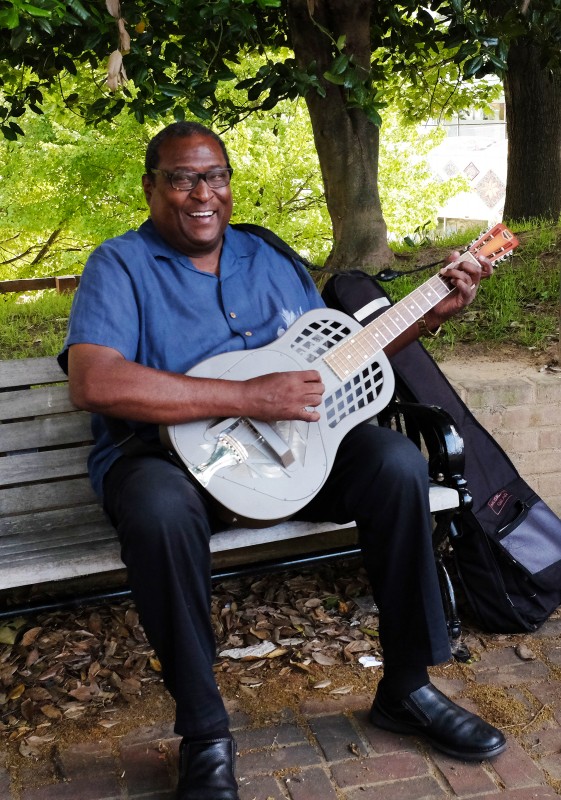There are fewer and fewer truehearted blues pickers who carry on the genuine, authentic Piedmont sound. In recent years the passing of John Jackson, John Cephas and Jerry Ricks has left a big hole to fill, but fortunately there are still some really great players carrying on this beloved sound. Among the new generation of Piedmont players is Rick Franklin, a swift practitioner. Franklin is an Arlington, VA resident who regularly performs in the Washington, DC metropolitan area. People often erroneously fail to associate Washington, DC , with the blues, but indeed it has been an important Piedmont Center where the sounds of Appalachia resonate in the blues. This is where Archie Edwards had his famous barber shop; where Bill Harris operated the great Pigfoot blues club; and, where the new blues audience of the 60s and 70s could catch Doc Watson at the Birchmere. John Jackson and Cephas & Wiggins were regularly performing all over the region. Flora Molton was a staple on the corner of H Street and16th the blues was all over town. The blues is still alive and well in the DC area and Rick Franklin is in the house!
Franklin proudly carries on this tradition. He was greatly influenced by Arthur “Blind” Blake, Bo Carter, Mississippi John Hurt, Big Bill Broonzy, and by Georgia Tom Dorsey & Tampa Red.
He has been actively playing the DC area since 1981. He regularly duos up with other local musicians, including harmonica Phil Wiggins and Mike Baytop, Neil Harpe and others. In the true folk music tradition, chances are that you can catch him performing at a local farmer’s market or a festival, in schools, and even in the local prison performing for appreciative albeit captive audiences. Farmer’s markets and other public events are prime ways to keep the blues vibrant, as unexpected visitors get free entertainment and exposure to the blues culture and acoustic live music. People who may otherwise not get a chance to hear traditional blues are in for a treat and musicians get a great local daytime gig. Franklin also actively teaches guitar.
Franklin is very much a blues musicologist. His past projects have included the revival of the music by Frank Stokes, one of the unsung great songsters and folk blues musicians from Tennessee. Currently Rick Franklin is working on a project that bridges the Appalachian regional folk and string band music with the blues, a musical journey that will surely again prove that throughout time since slavery days, black and white musicians have always played together, even if behind the scenes, borrowed from one another and inspired each other’s sounds. Black songsters brought the sound of African Americans to Appalachia, a sound carried on folks like Doc Boggs. The whites listened to the blacks and the blacks listened to the whites in a perpetual cultural exchange among musicians that transcended racism, racialism and Jim Crow segregation. Piedmont players like John Jackson had a repertoire that included songs by the so called father of country music Jimmie Rodgers. Howard Armstrong “Louie Bluie” played German and Polish folk songs in the language of his white immigrant audience. The amalgam of American roots music started here, with down home country music of black and white folks.
Rick Franklin, a fabulously heartfelt and skilled picker, hasn’t released that new project yet as he is reportedly deep into it, but you can soon expect a cultural treasure by this talented musician. He sings in a warm tenor, smoothly accompanying himself on guitar with the traditional Piedmont fingerpicking. His lighthearted, easy-swing syncopation carries a tune with a lightness, an underlying sensitivity and emotive touch of a gentle giant. Not only that but he has the chops to sit next to one of the finest blues harmonica players in the world, Phil Wiggins.
As they say in New York, Rick Franklin is “all that.”


